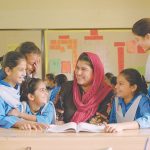Rawalpindi : Dr Wasim Sajjad, an assistant Prof,t National University of Medical Sciences (NUMS) has been selected to represent the University at virtual United Nations Office for Disarmament Affairs (UNODA) Biosecurity Diplomacy Workshop (BDW) being held in Geneva from February to March, following a competitive process.
Dr. Sajjad from the Department of Biological Sciences (DBS) is a master biosafety and biosecurity trainer who has recently completed his Biosecurity champion fellowship from Health Security Partners in USA.
He will represent NUMS at UNODA Geneva Branch and the Implementation Support Unit (ISU) of the Biological Weapons Convention (BWC) workshop which will be organised under the European Union Council, said a news release on Wednesday.
This workshop will bring together 30 young scientists from the Global South who have been working on topics related to the Biological Weapons Convention.
The workshop will provide them opportunities for professional development and exposure at the multilateral level.
It will also help them liaise and learn from multilateral disarmament experts.
With a view to harnessing the young scientists expertise for finding solutions to current biosecurity policy issues, the workshop will offer a space for dialogue between young scientists and BWC practitioners including diplomats and experts.
The participants will get the exposure of challenge of transferring scientific know-how to BWC policymakers can be utilized in diplomatic fora.
Meanwhile, another NUMS scientist from DBS, Dr. Adnan Haider got the distinction of being included in the list of top two percent cited authors in 2021 by the Stanford University US.
Dr Adnan Haider has post-doc from Yeungnam University, Daegu, South Korea and has published 73 articles in leading international journals.
This is the second year that his name has appeared on the list of the highly cited articles in prominent journals.
His research work focuses on the development of metal nanoparticles, synthesis of biopolymer composites and electrospun (fiber production method) nanofibers for biomedical and environmental applications.







